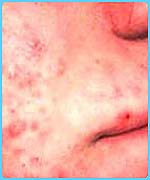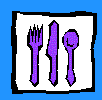
Acne

FACT: At some time or another during their teens 85% of young Britons suffer from acne.
the quick guide for Acne sufferers:
Don't squeeze them
Eat a balanced diet
Try a recommended face wash
Be patient, some treatments take a while to work
If you are really worried then go to a doctor
What is Acne?
Acne begins when the sebaceous glands overproduce oil, or sebum, secreted through the pores. Sebum carries dead call debris away with it, but its overproduction blocks the pores with a sticky mass of oil and dead cells. When this happens, the bacteria normally present in skin convert the mass into compounds that irritate the rupture small glands, causing inflammation and unattractive pustules - spots.
Treatment
85% of people get spots in their teens, so it's nothing to be particularly embarrassed about. If normal treatments aren't helping then you could try going to your pharmacy and asking for stronger non-prescription treatments such as Quinoderm, or go to the doctor, who can prescribe antibiotics.
Food and Eating

![]() Plagued
with pimples?
Plagued
with pimples?
Eat plenty of shellfish, nuts, skinless poultry and lean meat for zinc (yogurt and skimmed milk provide smaller amounts). Eat fresh fruit and vegetables for vitamin C and whole grains and cereals for vitamin B and zinc. Vitamin A helps to maintain a healthy skin, and in abundant in liver and eggs, as is beta carotene, which is found in dark green or orange vegetables such as spinach and carrots, and in orange fruits such as apricots and mangos. Eat plenty of polyunsaturated fats, as these have been claimed to counter-act acne. Vitamin E, found in wheat- germ, avocados, eggs and cold-pressed vegetable oils helps to heal the skin.
You should cut down on the refined carbohydrates found in sugary foods, fatty and fried foods such as burgers and chips, highly salted snacks, soft drinks and confectionary, chocolate and added sugar.
You should avoid Iodine-containing supplements.
![]() "Doctors
can zap acne with lasers"
"Doctors
can zap acne with lasers"